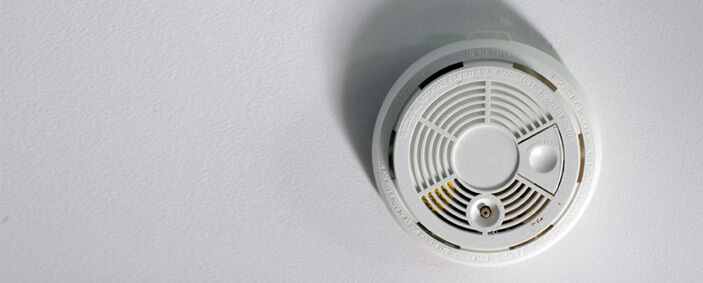smoke alarm beeping That high-pitched beep in the middle of the night — we’ve all been there. You shoot up in bed, heart racing, only to realise it’s not a burglar, but your smoke detector chirping like it’s auditioning for a horror movie soundtrack. Whether it’s a single beep every 30 seconds or a constant alarm, a noisy smoke detector can be maddening.
But here’s the thing: smoke detector beeping isn’t just an inconvenience. It’s a sign that something needs attention. Sometimes, it’s a minor issue. Other times, it might mean your home’s safety is at risk. In this in-depth guide, we’ll break down why your smoke alarm beeping is beeping, how to stop it, and what to do next.
Understanding the Types of Smoke Detector Beeps
Before diving into causes and solutions, let’s define the different types of sounds a smoke detector can make. Understanding the pattern helps you identify the issue faster.
1. Chirping (Intermittent Beep)
- Occurs every 30 to 60 seconds
- Usually indicates a low battery or internal issue
2. Continuous Beeping
- Loud, repeating alarm
- Signals smoke, fire, or, in some models, carbon monoxide detection
3. Multiple Beeps Followed by Silence
- May be part of a test sequence or error code
- Often used in smart detectors to signal specific faults
Why Is My Smoke Detector Beeping? 10 Possible Reasons
Let’s break down the most common reasons your smoke detector keeps beeping and what you can do about it.
1. Low Battery Warning
Sound: A single chirp every 30–60 seconds
Explanation: This is the most common reason for random beeping. Your smoke detector’s battery is dying and needs to be replaced.
Solution:
- Replace the battery with a new one, ideally lithium for long life
- Test the unit after replacing the battery
Tip: Even hardwired alarms typically have backup batteries that need replacing.
2. Battery Drawer Not Fully Closed
Sound: Chirping
Explanation: If the battery isn’t seated correctly or the battery drawer isn’t fully closed, the detector will chirp as if the battery is dead.
Solution:
- Open the unit
- Remove and reinsert the battery carefully
- Ensure the battery door clicks into place
3. End of Life Warning
Sound: Chirps with flashing light or spoken alert (on smart models)
Explanation: Smoke detectors have a lifespan of about 8–10 years. After this, they may chirp to alert you that they need replacing.
Solution:
- Check the date on the back of the unit
- Replace the entire smoke detector if it’s more than 10 years old
4. Dust or Debris Inside the Detecto
Sound: Irregular or random chirps
Explanation: Smoke detectors are sensitive to small particles. Dust, spider webs, or even bugs can trigger a false alarm.
Solution:
- Remove the detector
- Use a vacuum with a brush attachment or compressed air to clean it
- Avoid using water or harsh chemicals
Pro Tip: Clean your smoke detectors every 6 months to prevent false alarms.
5. Humidity and Steam
Sound: Loud alarm or false alarm
Explanation: Moisture from showers or cooking can trigger a photoelectric smoke detector (which is more sensitive to particles).
Solution:
- Relocate the alarm away from bathrooms or kitchens
- Use an exhaust fan when cooking or showering
6. Temperature Fluctuations
Sound: False alarms or short beeping
Explanation: Extreme cold or heat, especially in garages or attics, can cause the alarm to malfunction.
Solution:
- Avoid installing detectors in uninsulated areas
- Use detectors rated for temperature extremes if necessary
7. Electrical Issues (For Hardwired Units)
Sound: Random beeping or chirping
Explanation: If you have a hardwired smoke detector, electrical surges or loose wiring can cause false alarms.
Solution:
- Turn off the circuit breaker
- Remove the unit and check the wiring connections
- If unsure, call an electrician
8. Interconnected Smoke Detectors
Sound: Multiple alarms going off simultaneously
Explanation: Many modern systems connect smoke alarm beeping so when one detects smoke, all of them sound. If one has a fault, it can trigger others.
Solution:
- Identify the source alarm (usually the one flashing)
- Check or replace it
- Reset all connected alarms
9. Malfunction or Internal Error
Sound: Persistent chirping or error tone
Explanation: A glitch in the internal circuitry can cause the detector to beep incorrectly.
Solution:
- Try resetting the unit (usually a button on the front)
- If the issue persists, replace the detector
10. Smoke or Fire
Sound: Continuous loud alarm
Explanation: Don’t overlook the obvious, your smoke alarm beeping could be detecting smoke or fire.
Solution:
- Stay calm and investigate cautiously
- If there’s any sign of a smoke alarm beeping, evacuate immediately
- Call 911 from a safe location
How to Stop a Smoke Detector from Chirping
Once you’ve identified the cause, follow these steps to silence the beeping.
✅ Step-by-Step Reset Instructions:
- Turn Off Power (for hardwired units)
Turn off the circuit breaker that controls the smoke alarm beeping. - Remove the Detector
Take the detector off its mounting bracket. - Take Out the Battery
Remove the battery completely. - Hold the Test Button
Press and hold the test button for 15–30 seconds to drain any remaining charge. - Reinsert the Battery and Reattach
Place a new battery and reattach the unit to the bracket. - Turn Power Back On
Flip the circuit breaker back on. - Test the Unit
Press the test button once more to ensure it’s working properly.
Preventative Maintenance Tips
Let’s be honest — nobody wants to be startled awake at 3 AM by a beeping alarm. Preventive care can help avoid those unpleasant surprises.
🔧 1. Replace Batteries Annually
Even long-life batteries can fail earlier than expected.
🧼 2. Clean Detectors Twice a Year
Use a vacuum or compressed air to keep them dust-free.
🕒 3. Replace Units Every 10 Years
Check the manufacturing date on the back and mark your calendar.
💡 4. Test Monthly
Press the test button on each detector once a month to ensure it’s functioning.
🛠️ 5. Install Properly
Keep alarms at least 10 feet from stoves and bathrooms to reduce false alarms.
Should You Call a Professional?
While many chirping issues can be fixed at home, there are times when calling in an expert is the best choice.
Call a pro if:
- You suspect wiring issues
- You can’t identify the source of the chirping
- The beeping persists after troubleshooting
- You’re uncomfortable with electrical work
Types of Smoke Detectors and How They Behave
There are different types of smoke alarm beeping, and each may chirp for different reasons. Knowing which one you have helps in troubleshooting.
🔥 Ionisation Detectors
- Faster at detecting flaming fires
- More prone to false alarms from burnt food or steam
💨 Photoelectric Detectors
- Better at detecting smouldering fires
- More sensitive to dust and humidity
🧠 Smart Detectors (e.g., Nest Protect)
- Provide spoken alerts
- Use apps to pinpoint problems
- Can detect carbon monoxide as well
🔌 Hardwired Detectors
- Connected to household power
- Have a battery backup
- Can be interconnected
Final Thoughts: Your Safety Comes First
When your smoke detector beeps, it’s not just an annoyance — it’s communication. Whether it’s a dying battery, a dusty sensor, or a real emergency, the sound means you need to pay attention.
In a best-case scenario, you swap out a battery and enjoy peace. In a worst-case scenario, that annoying beep could be the difference between safety and tragedy.
By taking time to understand your alarm system, keeping it clean and up to date, and acting promptly when it beeps, you’re protecting more than just your home — you’re protecting your life and the lives of those around you.
FAQs: Why Is My Smoke Detector Beeping?
Q: Can a smoke detector beep without a battery?
Yes, many hardwired detectors have a backup battery. If it’s removed or dead, the unit can chirp to indicate the issue.
Q: How do I know if my smoke detector is expired?
Look at the back of the unit. There should be a manufacture or expiration date. If it’s over 10 years old, replace it.
Q: Is it safe to remove the battery to stop the noise?
Only temporarily. Never leave a smoke detector without a power source. Replace the battery immediately or replace the unit.
Q: Can pets or loud sounds set off a smoke alarm?
Not usually. However, smoke detectors can react to airborne particles, which may be stirred up by pets or vacuums
Read More: Guide to Best Digital Business Card










